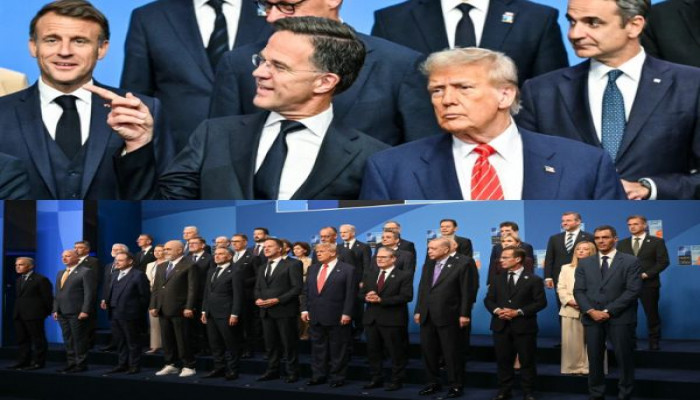NATO countries commit to raise defence spending to 5 percent of GDP by 2035
- In Reports
- 08:05 PM, Jun 26, 2025
- Myind Staff
NATO allies on Wednesday agreed to raise their defence spending target from 2 percent to 5 percent of gross domestic product by 2035, marking the most significant step taken by the alliance in over a decade.
In a joint statement, the Western defence alliance said it was “unified in the face of deep security dangers and challenges,” particularly pointing to the long term threat of Russia to Euro Atlantic security and the “persistent threat” of terrorism.
“Allies agree to spend 5 percent of GDP each year on key defence needs as well as defence and security-related expenditures by 2035 to meet our respective and collective commitments,” the statement further said.
The 5 percent spending includes “at least” 3.5 percent of GDP for “pure” defence, while the remaining amount will be used for security and defence-related “critical infrastructure” to support “our civil preparedness and resilience, unleash innovation, and strengthen our defence industrial base.”
The alliance said that all members would need to submit yearly plans “demonstrating a credible, incremental approach to achieve this objective,” after some member countries like Spain raised objections.
Several member states have not yet fulfilled the 2014 commitment to spend 2 percent of their GDP on defence.
This major shift comes as the conflict between Russia and Ukraine continues and as instability increases in the Middle East.
The new target also follows years of pressure from former US President Donald Trump, who repeatedly urged American allies in Europe and Canada to raise their contributions to the alliance’s shared defence.
On Wednesday, NATO also reaffirmed its “ironclad commitment to collective defence” under Article 5, which states that an attack on any one member is considered an attack on all, following concerns about the United States’ reliability on this commitment.
“We stand together and firm in our commitment to defend our one billion people, defend the Alliance, and defend our freedom and democracy,” it said.
At the summit, NATO Secretary General Mark Rutte described the agreement as a “quantum leap” in the alliance’s defence efforts. He said the decision would “not only make us more secure but also generate jobs” and added that the allies had “made strong commitments to counter significant threats.”
Rutte said that all member nations understood the seriousness of the situation and were “united in recognising that we must up our game if we want to remain safe.”
He also said that President Trump had shown support for NATO but had called for more contributions from Canada and European countries, “and that is precisely what we see them doing,” Rutte said.
Rutte stated that this was “Day One” of the work required to strengthen NATO’s defence and added, “We must innovate and we must act swiftly.”
He said, “The choices that we make today will make NATO that much more powerful, they also make NATO a more equitable alliance. The will of allies is clear, we are in this together, dedicated to Article 5, and we are committed to standing firm.”
When asked about Trump by reporters, Rutte replied, “I think he deserves every credit.”
Trump had landed late on Tuesday and appeared to question the alliance’s main principle under Article 5, which holds that an attack on one NATO member is treated as an attack on all.
“There are many definitions of Article 5. You know that, don’t you?” Trump said to reporters on Air Force One. “But I’m determined to be their friend, you know, I’ve become a friend of many of those leaders, and I’m determined to assist them.”
On Wednesday, Rutte said he trusted the president and believed that the United States was “totally committed” to NATO and added “You know, Article 5 is absolutely clear, and at the same time we have always said that we will never go into details on when Article 5 will be triggered.”
Rutte also said he believed that Spain was “serious” about meeting the 3.5 percent defence goal, even though it had raised concerns about the increase before the summit.
The President of Finland described the 2025 NATO summit as a “rebalancing of a new NATO where we have more balance and more Europe in it” and told CNBC that the mood at the session had been “cool, calm and collected.”
Alexander Stubb told CNBC’s Steve Sedgwick, “There was a great deal of self-congratulation which I think was well deserved because in many ways this was a historic meeting of NATO returning to its roots of collective self-defence as a deterrent against Russia.”
Stubb said both Trump and Rutte were “very happy” with the outcome and “there were a lot of smiles around the table, regardless of the difficult situation that we’re in.”
He added, “I think the Americans are happy and the Europeans have woken up and smelled the coffee.”
Speaking about Spain’s change of stance, German Foreign Minister Johann Wadephul told CNBC, “In the end, they knew one against 31 makes no sense.”
He said the clearest message from the summit was that NATO would “stick together completely” and described it as an “ironclad” outcome.
Wadephul said that Germany, which had already promised to meet the 5 percent target before the summit, had taken time to reach this point but was now ready to play a stronger leadership role in European defence.
He concluded, “The U S has recognised that Europe is back again.”







Comments